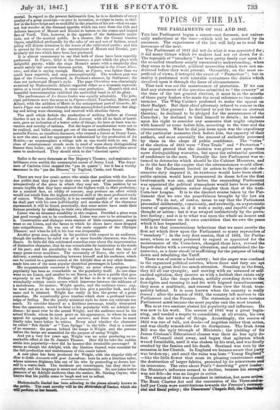There are very few comic actors who attain that position
with the Lon- don public that they draw by their own sole power of attraction almost irrespectively of the piece in which they may act. This position by no means implies that they have attained the highest walk in their profession; for a comical face, an oddity of manner, may produce an effect which would not result from the highest artistical skill or the most profound study of nature. When' theoretically, it is an essential quality of an actor that with he shall part wihis own individuality and assume that of the character represented, it will be found, practically, that some actors have made their fortune precisely by sticking to their own idiosyncracies.
Liston was an immense notability in this respect. Provided a piece were just good enough not to be condemned, Liston was sure to be attractive in it. Construction and dialogue were matters of little consequence: people went to see Liston, and the farces in which he shone have since dropped into insignificance. He was one of the main supports of the Olympic Theatre; and when he left it his loss was irreparable.
Another great man, similar in his position with respect to an audience, though the audience he ruled was of a more humble character, was John Reeve. So little did this celebrated comedian care about the impersonation of distinctive character, that he was remarkable for inattention to the words of his part; and his peculiarity in this respect has formed the basis of many green-room anecdotes. The unctuosity of Reeve, the style of his delivery, a certain understanding between himself and his audience, which can be carried to a greater extent at the Adelphi than at any other theatre, made him one of the most popular theatrical personages in London.
His unquestionable successor is Wright; an actor whose progress into popularity has been as remarkable as the popularity itself. As one class went to see Liston, and another to see Reeve, so is there a public that goes expressly to see Wright. Perhaps all he has to do is to appear in some wretchedly-written comic scenes which intervene between the tableaux of a melodrama. No matter; Wright speaks, and the audience roars: nay, he need not go so far as speaking—let him give a peculiar look, and the same end is attained. Wright has really in him the germs of a great comedian. He occasionally gives touches which show a profound know- ledge of feeling. But the purely artistical style he dares not cultivate too much. To consider himself as a fictitious personage, totally abstracted from the spectators, would be fatal to his popularity with an Adelphi au- dience: he must ever be the actual Wright; and the audience must be his actual friends, whom he must greet on his appearance, to whom he must appeal for sympathy in his joys and sorrows, and from whom he must finally take leave before he retires. Never mind whether the character be called "Bob Smith" or " Tom Sprigs" in the bills: that is a matter of no moment: the person behind the lamps is Wright, and the persons before the lamps are assembled for the purpose of seeing Wright.
And yet a very few years ago, Wright was an actor producing no re- markable effect at the St. James's Theatre. How did he take the sudden stride into popularity—how did he become this irresistible personage? It seems as though the Adelphi, with the liberties thereof, were essential for the full production and maintenance of this comics talent.
A new piece has been produced for Wright, with the singular title of How to Settle Accounts with your Laundress: here he acts a libertine tailor, whose mistress frightens him out of his wits by pretending to drown her- self in a water-butt. The incidents are extravagant, but they show in- genuity, and the language is smart and characteristic. No one takes better measure of an Adelphi audience than the anther, Mr. Stirling Coyne; who knows that his public come to laugh and not to reflect.


























 Previous page
Previous page